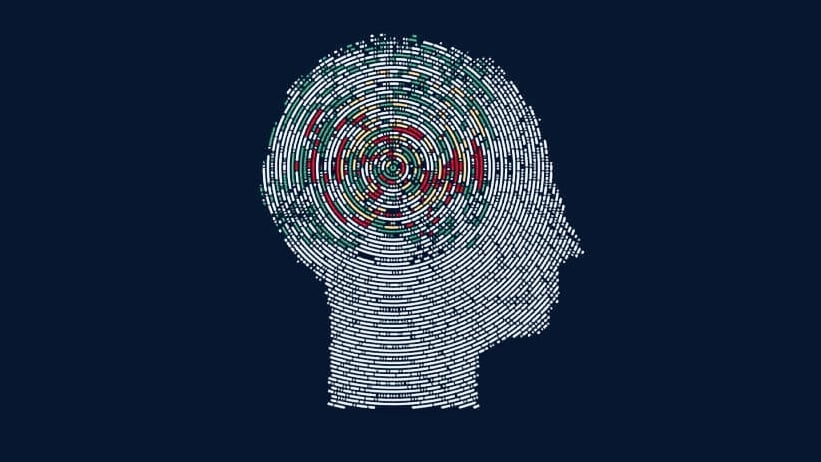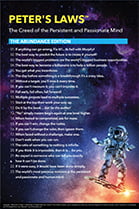
An Abundance Mindset is all about a change in perspective—enabled by innovation.
As we saw in the previous blog in this Scaling Abundance series, it’s the idea that instead of mining a limited number of imperfect diamonds, you can grow perfect diamonds instead in the lab in near-infinite supply.
Today, I want to share with you what it means to make this shift in mindset and why it’s so important.
Let’s dive in…
Shifting Your Perspective to Abundance
Scarcity is often contextual.
Something is often scarce until you create a technology that enables abundance.
One of the simple examples that I originally described in my earlier book Abundance: The Future is Better Than You Think goes as follows:
“Imagine a giant orange tree packed with fruit. If I pluck all the oranges from the lower branches, I am effectively out of accessible fruit. From my limited perspective, oranges are now scarce. But once someone invents a piece of technology called a ladder, I’ve suddenly got new reach. Problem solved, scarcity over. My supply of oranges has now expanded. Technology is a resource liberating mechanism. It can make the once scarce, the now abundant.”
Here's another example of how technology leads to increasing abundance that is fundamental for life on Earth and a planet of 8 billion-plus humans.
Energy Abundance...
In the realm of energy, we once hunted whales to get whale oil to light our nights.
In the 18th and 19th centuries, our source of energy for lighting was whale oil... a burgeoning whaling industry arose, fueled by a global hunger for oil to feed our whale-oil lamps. At the industry's peak, between 1846 and 1852, an estimated 8,000 whales were slaughtered each year.
A single sperm whale, the species that the whalers hunted most, could yield up to 40 barrels of oil, which was used mostly for lighting. Historical data suggests that a single gallon of whale oil could burn for approximately 140 hours in a standard oil lamp, which ultimately translates to a single large sperm whale producing 40 barrels or 240,000 hours’ worth of light.
But this prosperity came at a high price.
The relentless pursuit of whale oil by our forebears resulted in a precipitous decline in whale populations. As reported by the New Bedford Whaling Museum, by the mid-19th century, the sperm whale population had been diminished to a fraction of their former numbers, a stark reminder of humanity's capacity to unbalance the scales of nature.
Next, the Industrial Revolution in the mid-18th century ignited our reliance on coal.
British engineers like Thomas Newcomen and James Watt refined the steam engine, transforming coal from a simple heating source to a powerful driver of machinery. And coal became critical to industrial progress—fueling factories, railways, and steamships, and forever changing the world's economic and social landscapes.
In 1800, global coal production was estimated at 10 million tons.
By the turn of the 20th century, this figure had skyrocketed to 1 billion tons, reflecting the scale and speed of industrialization. According to the International Energy Agency (IEA), 8 billion tons of coal were mined in 2022 (4.4 billion tons in China) and accounted for 27% of global energy consumption.
Beyond coal, humanity next pursued oil.
We drilled kilometers under the ground and under the ocean floor to fuel our economy. By 2022, on the order of 100 million barrels of oil were collected each year, accounting for ~38.5% of global energy consumption.
But as technology marches forward, just like coal displaced whale oil, soon solar and fusion will displace our petroleum economy.
As we’ll see much later in this series, we are rapidly heading towards enabling humanity with a squanderable abundance of energy.
Why This Matters
The challenge we all face in shedding ourselves of our scarcity bias and embracing abundance is the hardwiring of the “human default setting” in our minds.
It can sneak up on us.
That’s why I’ve dedicated this and the next few blogs in this series to what I all “the basics of abundance”: key ideas and themes that help you shift your thinking from pessimism to possibility.
In our next blog, we’ll continue our tour of these abundance basics and explore the power of exponential growth.
I wanted to take a second to tell you about a company I'm personally invested in and that is a part of my personal health optimization: Seed Health, a microbiome science company that is doing incredible research (which you’ll hear more about from me and on the podcast in the coming months). Seed is most known for their innovations and clinical research in probiotics—especially DS-01®, which I take and believe is the best probiotic available.
Unlike our genome, our gut microbiome is one of the most important levers of health given its connectivity to almost every biological function and organ system. How can you optimize your gut health? In addition to diet and other lifestyle choices, here’s what I do:
Every day, I take two capsules of Seed’s DS-01® Daily Synbiotic: a broad spectrum 2-in-1 probiotic and prebiotic formulated with 24 genetically distinct clinically- and scientifically-studied probiotic strains and a polyphenol-based prebiotic.
Developed from a deep understanding of the complex interactions within the microbiome, DS-01® confers benefits in and beyond the gut. This novel synbiotic preserves ecosystem function, fortifies the gut barrier, promotes healthy regularity, reinforces an optimal gut-skin axis, promotes cardiovascular health, and supports healthy immunological responses in the GI tract.
The specific prebiotic is sourced from the skin of Indian pomegranate and has also been clinically validated to support healthy aging, including the reduction of aging markers like the appearance of wrinkles. Unlike most fiber-based prebiotics, Seed’s is non-fermenting which makes it gentler on the stomach and tolerable for a FODMAP diet.
In contrast with most probiotics, DS-01® is engineered to survive with Seed’s patented capsule-in-capsule ViaCap® technology that optimizes viability and delivers a precision release to the colon, where it matters most. This technology also ensures stability, so there’s no refrigeration required.
Known for their renowned scientists in the field of microbiome and probiotics, Seed’s scientific rigor and ongoing research have set them apart from others. DS-01® strains have been clinically studied in over 20 clinical and mechanistic studies. Two clinical trials evaluating the DS-01® formulation have recently been completed: one assessing the impact of DS-01® on patients with Irritable Bowel Syndrome (IBS) under Investigational New Drug authorization from the FDA; and another evaluating the effects of DS-01® on the gut microbiota during and after antibiotic usage (under Health Canada authorization). This new data is anticipated to be published in high-impact scientific journals in the coming six months.
I value Seed's scientific rigor and the company's work. This is why I believe DS-01® is so effective and has become the probiotic of choice not just for me, but for so many other people I respect.
As part of my mission to help my community optimize their health, we’ve worked with Seed to create a code for our readers. Use code MOONSHOTS for 25% off your first month of Seed’s DS-01®.
I discuss topics just like this on my podcast. Here’s a conversation I recently enjoyed:
A Statement From Peter:
My goal with this newsletter is to inspire leaders to play BIG. If that’s you, thank you for being here. If you know someone who can use this, please share it. Together, we can uplift humanity.
Topics: Abundance Entrepreneurship Abundance 360 a360








